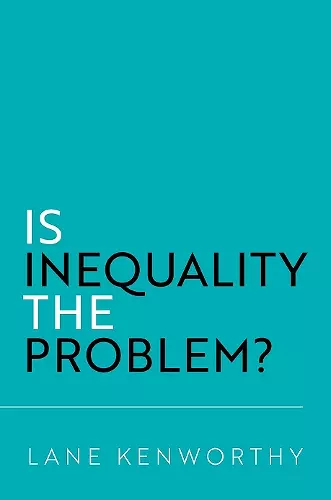Is Inequality the Problem?
Format:Paperback
Publisher:Oxford University Press Inc
Publishing:17th Jan '26
£18.99
This title is due to be published on 17th January, and will be despatched as soon as possible.
This paperback is available in another edition too:
- Hardback£71.99(9780197817094)

A data-rich analysis that will reshape our understanding of how rising income inequality has actually affected societies in the industrialized world. Increasing economic inequality is now one of the most studied subjects in the social sciences. The general view is that while its increase represents a bad social outcome in and of itself, its negative impact extends into numerous other realms of social life: declines in living standards for those in the lower deciles of the income ladder, worse health outcomes, reductions in happiness, and less opportunity for most. In Is Inequality the Problem?, Lane Kenworthy draws from a vast trove of research on the rich democracies to argue that while inequality is normatively a problem and we should therefore work to reduce it, the evidence from wealthier countries does not show that income inequality has contributed much at all to the other social ills it is associated with, like poor health outcomes. The effects vary from society to society, but typically the key contributors to negative trends like this one are factors other than inequality. Instead of trying to improve living standards, democracy, opportunity, health, and happiness indirectly via reduction in income inequality or wealth inequality, policy makers are more likely to make progress by pursuing these goals directly. This contrarian yet balanced account of one of the main social problems of our era will reshape our understanding of how rising economic inequality has affected societies in the industrialized world.
This is one of those rare, must-read books. It is a tour-de-force which compels us to rethink which policy formulae promote more equality of opportunity embedded in the socioeconomic order. Analyses of an impressive amount of data lead Kenworthy to conclude that this will depend less on income redistribution, and more on a welfare state that invests in its citizens' human capital and life chances via high-quality and universal social services. * Gøsta Esping-Andersen, Universitat Pompeu Fabra *
Many academics and policy pundits believe that fighting income and wealth inequality is best tackled through higher taxes on the rich. In this provocative book, based on hard evidence, Lane Kenworthy advocates an alternative strategy. Fighting poverty is really improving the living standards of the least well-off, by giving more people access to income protection, capacitating child and family care services, education and training, active labor market policies and work-life balanced employment relations, public health and basic pensions. Improving equality of opportunity in this way will henceforth mitigate social inequality. * Anton Hemerijck, European University Institute *
On a topic dominated by warring screeds, this book is a welcome, balanced, evidence-based account of the consequences of inequality. This book is especially for everyone who thinks they already know all the answers about inequality-because they will find out how much they have to learn from Lane Kenworthy. * Jason Furman, Professor of the Practice of Economic Policy, Harvard University, and Former Chairman of the Council of Economic Advisors *
This is one of those rare, must-read books. It is a tour-de-force which compels us to rethink which policy formulae promote more equality of opportunity embedded in the socioeconomic order. Analyses of an impressive amount of data lead Kenworthy to conclude that this will depend less on income redistribution, and more on a welfare state that invests in its citizens' human capital and life chances via high-quality and universal social services. * Gøsta Esping-Andersen, Universitat Pompeu Fabra *
Many academics and policy pundits believe that fighting income and wealth inequality is best tackled through higher taxes on the rich. In this provocative book, based on hard evidence, Lane Kenworthy advocates an alternative strategy. Fighting poverty is really improving the living standards of the least well-off, by giving more people access to income protection, capacitating child and family care services, education and training, active labor market policies and work-life balanced employment relations, public health and basic pensions. Improving equality of opportunity in this way will henceforth mitigate social inequality. * Anton Hemerijck, European University Institute *
On a topic dominated by warring screeds, this book is a welcome, balanced, evidence-based account of the consequences of inequality. This book is especially for everyone who thinks they already know all the answers about inequality-because they will find out how much they have to learn from Lane Kenworthy. * Jason Furman, Professor of the Practice of Economic Policy, Harvard University, and Former Chairman of the Council of Economic Advisors *
ISBN: 9780197817100
Dimensions: 226mm x 150mm x 15mm
Weight: 249g
176 pages